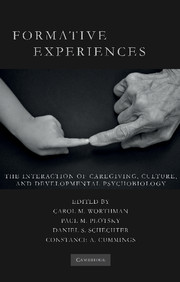Book contents
- Frontmatter
- Contents
- List of Figures
- List of Tables
- List of Contributors
- Foreword by Robert Sapolsky
- Preface
- List of Abbreviations
- Introduction
- SECTION ONE HISTORICAL, CROSS-CULTURAL, AND DEVELOPMENTAL SCIENCE PERSPECTIVES
- SECTION TWO HOW EXPERIENCE INTERACTS WITH BIOLOGICAL DEVELOPMENT
- SECTION THREE FORMATIVE RELATIONSHIPS WITHIN AND ACROSS GENERATIONS
- SECTION FOUR SOCIAL AND CULTURAL CONTEXTS OF CHILDHOOD DEVELOPMENT – NORMATIVE SETTINGS, PRACTICES, AND CONSEQUENCES
- SECTION FIVE FEAR, FUN, AND THE BOUNDARIES OF SOCIAL EXPERIENCE
- SECTION SIX PUBLIC HEALTH, EDUCATION, AND POLICY IMPLICATIONS
- Index
SECTION FOUR - SOCIAL AND CULTURAL CONTEXTS OF CHILDHOOD DEVELOPMENT – NORMATIVE SETTINGS, PRACTICES, AND CONSEQUENCES
Published online by Cambridge University Press: 26 May 2010
- Frontmatter
- Contents
- List of Figures
- List of Tables
- List of Contributors
- Foreword by Robert Sapolsky
- Preface
- List of Abbreviations
- Introduction
- SECTION ONE HISTORICAL, CROSS-CULTURAL, AND DEVELOPMENTAL SCIENCE PERSPECTIVES
- SECTION TWO HOW EXPERIENCE INTERACTS WITH BIOLOGICAL DEVELOPMENT
- SECTION THREE FORMATIVE RELATIONSHIPS WITHIN AND ACROSS GENERATIONS
- SECTION FOUR SOCIAL AND CULTURAL CONTEXTS OF CHILDHOOD DEVELOPMENT – NORMATIVE SETTINGS, PRACTICES, AND CONSEQUENCES
- SECTION FIVE FEAR, FUN, AND THE BOUNDARIES OF SOCIAL EXPERIENCE
- SECTION SIX PUBLIC HEALTH, EDUCATION, AND POLICY IMPLICATIONS
- Index
Summary
The material in this section leads to encounters with the old anthropological problem of how to evaluate culturally normative conditions and practices. Concerning pathways in human development, how many roads lead to Rome? What makes a practice “good” or “right” for a child? Hence, Glover responds to Briggs's case study about Inuit use of teasing and shaming for early child socialization by asking “whether the type of upbringing described will really help young Inuit children adapt successfully to their future life.” Similarly, Kirmayer notes the “urgency to understand cultural variations in parenting practices and healthy developmental trajectories.”
But how do we define “success” and “healthy”? Such questions spring to mind when we are confronted with normative practices of other cultures that jar against our own. We start to wonder about what childcare practices really do, as opposed to what culturally received views suggest they do, although we may not be so quick to ask the same critical question about our own society. Through its engagement with other cultures, anthropology has cultivated unsettling epistemological moments to cast into relief preconceptions about the “natural order” of things and permit us to see our and others' worlds in a new light.
Now with globalization and media, all of us are anthropologists. Encounters with unfamiliar cultural logics and meanings may catch us up at any moment, with unexpected and enduring effects.
- Type
- Chapter
- Information
- Formative ExperiencesThe Interaction of Caregiving, Culture, and Developmental Psychobiology, pp. 281 - 283Publisher: Cambridge University PressPrint publication year: 2010



